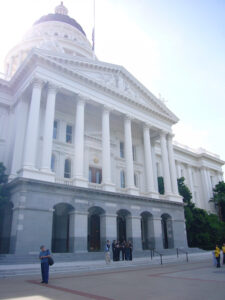Blogs – manual
Lawyers often fail to use the most up-to-date scientific evidence on the cause of rising temperatures, a new study finds. As a result, little compensation has been given to climate change victims so far. That could change soon, however. There have been some notable successes for environmental groups, such as in a recent case against Shell decided by a civil court in the Netherlands. So far, around 1,500 climate-related lawsuits have been brought before the courts around the world. This number is estimated to rise. Attorneys and judges thus need to be prepared to keep pace with the work of attribution scientists, so that their judgements are in line with the latest scientific evidence.
The U.S. Supreme Court just ruled that “general corporate activity” does not in and of itself create jurisdiction for American federal courts to hear tort cases under the Alien Tort Statute (“ATS”). To plead facts sufficient to support a domestic application of the ATS, plaintiffs must allege more domestic conduct than the general corporate activity that is common to most corporations. In the case involving Nestlé USA and Cargill, two major U.S. corporations, six individuals from Mali alleged that they were trafficked into Ivory Coast as child slaves to produce cocoa. The American companies do not own or operate cocoa farms in Ivory Coast, but they do buy cocoa from farms located there and provide those farms with technical and financial resources. However, “nearly all” the conduct alleged by plaintiffs to aid and abet forced labor occurred outside the U.S. This particular legal outcome is not surprising after the Supreme Court’s similar findings in, for example, Kiobel and Jesner. The currently conservative Court is not in favor of courts adjudicating alleged violations of international law occurring overseas. Rather, it sees the executive and legislative branches as the primary governance entities in this context. Good news in this context is two-fold: First, the Supreme Court did not “close the door” that is thus still “ajar” to domestic use of the ATS after prior cases found this to be the case. Second, five justices concluded that corporations should be treated no differently than natural persons for ATS purposes. This means that given sufficient domestic conduct in relation to the overseas torts, American courts may still be able to hear cases alleging, for example, child slavery, environmentally related torts, or other torts committed in other nations. This could be beneficial to plaintiffs as American courts are much more likely to award large sums of money to plaintiffs than the domestic courts of those same plaintiffs, many of whom reside(d) in developing nations.
An expert panel commissioned by the Stop Ecocide Foundation has proposed the recognition of “ecocide” as a new international crime in the Rome Statute of the International Criminal Court (“ICC”). The ICC already recognizes genocide, crimes against humanity, war crimes, and the crime of aggression. The ICC is the only global mechanism which directly weighs in on the criminal justice systems of its 123 member states. It has been 75 years since the phrases “genocide” and “crimes against humanity” were first used in the Nuremberg Trials. But why a new crime now? Per the Foundation: “Innovation and change on a major scale are required for humanity to thrive sustainably. Ecocide law can level the playing field for solutions and stimulate development in a healthy direction in all areas, while providing a guardrail (enforceable deterrent) to ensure best practice. Beyond that, it has the power to strongly shift cultural assumptions and our understanding of our place in, and responsibility towards, the natural world.” In 2010, activist and attorney Polly Higgins presented the following definition of ecocide to the UN Law Commission: “Ecocide is extensive loss, damage or destruction of ecosystems of a given territory(ies) … such that the peaceful enjoyment of the inhabitants has been or will be severely diminished.” Since late 2019, 8 ICC member states (Vanuatu, Maldives, France, Belgium, Finland, Spain, Canada, and Luxembourg) as well as the Pope and the EU have publicly expressed interest in the possibility of amending the Rome Statute. In-principle support for the crime of ecocide at the Inter-Parliamentary Union, comprising delegations from 179 parliaments around the world was virtually unanimous in May 2021. Proposals of law and/or parliamentary motions have been submitted in Belgium, France, Bolivia, Portugal, Sweden, Brazil. This step is promising in times of continued and worsening climate change, habitat loss, species loss, coral reef destruction, and many other dire symptoms of the damage we are causing to our own planet as well as our own physical and mental health. But will it help? Despite longtime, worldwide agreement that genocide is unacceptably horrible, it still takes place to this day (just think Rohyngia, Yazidi, and Bosnia). The same can be said for “crimes against humanity” (for example, forced removals, imprisonment or deprivation of physical liberty that violates international laws, forced prostitution and rape; discrimination and tyranny against certain groups and many other inhumane acts). Nonetheless, it is abundantly clear that the global society needs to take action on the environmental front from a multitude of angles. Recognition of ecocide at the top international level would be more than simply a good signal; it would enable prosecutions of actions that may have as broad and severe effects as the currently recognized international crimes. It will be interesting to see further developments in this area and how non-actions will be addressed. For example, climate change is caused by the lack of action by many state and private parties. But again, the recognition of detrimental environmental issues as crimes would be major.
Dear Governor Newsom and California legislators: I write to suggest that you initiate a legislative change of Section 13107 of the California Election Code. The 2018 change of the Code made it virtually impossible for anyone but prosecutors (“deputy district attorneys”, hereinafter “DDAs”) and certain other government attorneys to become elected judges. This is highly inequitable for other types of candidates and thus democratically undesirable. This issue requires urgent attention. A legislative change would have no fiscal effect. Recommendation: Section 13107 should be changed so that only the ballot designation “attorney at law” can be used by anyone running for office. Allowing DDAs and others already in government employ to continue using both their full titles and locations (e.g. “Maria Smith, Deputy District Attorney of the County of Los Angeles;” no less than eleven words compared to the three allowed for others) gives that candidate a demonstrable and unfair advantage over non-DDA and non-government candidates. No one else than DDAs (or, more rarely, other government attorneys) can win under the current wording of the law. This effect is highly undemocratic and undesirable given the need for diversity in government structures including the judiciary. Legislative history: Before 2018, numerous prosecutorial candidates for judicial office chose designations that were seen as “disingenuous and histrionic” such as ‘Hardcore Gang Prosecutor,’ ‘Sex Crimes Prosecutor,’ ‘Gang Homicide Prosecutor,’ ‘Criminal Gang Prosecutor,’ ‘Gang Murder Prosecutor,’ ‘Major Narcotics Prosecutor,’ ‘Criminal Murder Prosecutor,’ ‘Criminal Homicide Prosecutor,’ ‘Child Molestation Prosecutor,’ ‘Government Corruption Prosecutor,’ ‘Violent Crimes Prosecutor,’ or ‘Sexual Predator Prosecutor’1. The law was altered to prevent such overly suggestive designations. Current law: The current version of Section 13017 took effect for “all judicial elections held on or after January 1, 2018.”2 In pertinent part, the law that relates to ballot designations allows prosecutors (“deputy district attorneys”) to use “[w]ords designating the actual job title” and, since prosecutors are employed by the county in which they work, the word “County of.” California Election Code §13107(b)(2)(A), 3(B). Thus, the ballot designation of a prosecutor running for office will be “Deputy District Attorney, County of Los Angeles.” In contrast, candidates for judicial office who are not prosecutors may only use “[n]o more than three words designating either the current principal professions, vocations, or occupations of the candidate….” California Election Code §13107(b)(1)(C). (The designations “attorney” and “lawyer” may also be used in connection with a candidate’s principal profession.). Thus, a “regular,” non-governmental attorney may only use the ballot designations “Attorney at Law,” Attorney,” or “Lawyer.” Some candidates who have two job functions have run as, for example, “Attorney, Radio Producer” or “Law Professor, Attorney.” Those ballot designations comply with the three-word limit, but place such candidates at a great disadvantage compared to government attorneys, especially DDAs. Effect & analysis: Year DDAs Other gov’t atty Regular atty 2020 11 1 0 2018 5 6 0 2016 3 4 0 2014 14 1 0 2012 3 3 0 Total 36 15 0 Winners in LA County Superior Court Judge elections and ballot designations Of 51 elected judges, zero were non-prosecutors or non-governmental attorneys. Zero. As you can see, in 2018, eleven judicial seats were filled via the election. Six seats went to DDAs, two to existing judges, two to commissioners (a judicial function), and one seat to a senior deputy county counsel.3 No a single candidate not already in government service won! In 2020, twelve judicial seats were filled by no less than twelve candidates with prosecutorial backgrounds. Eleven out of twelve were DDAs. Once again, not a single regular attorney won!4 It has become clear that DDAs and select other government attorneys enjoy a vastly unfair advantage currently that is undesirable seen from public policy and democratic angles and that they are crowding the field of elections, preventing others from becoming elected and thus preventing the diversity in professional backgrounds that is called for by numerous constituents and government leaders alike.5 In short, it has become abundantly clear that the current version of the Code has the effect that only prosecutors can get elected to office. This is so because judicial candidates are among the least known on the ballot despite large amounts of money and effort being spent on these races, which end up in positions held until the elected judge retires, often only after decades of bench service. The playing field is simply not level for candidates. This must be rectified given the unfortunate reality of voters either not voting at all for judges (in 2020, only approx. 50% of voters voted for judges) and/or not informing themselves sufficiently about the judicial candidates. While voters of course, should, reality is clear: they do not. They simply vote for “fancy”-sounding titles. Proposed change: Section 13107 of the California Election Code should be amended so that all judicial candidates are only allowed to use one ballot designation: “Attorney at law.” All candidates are, in fact, attorneys. This would create equality in ballot designations, thus removing the clear advantage that, primarily, DDAs and, secondarily, other government attorneys have. In a modern democracy, it is key that elections are as fair and impartial as possible. This is far from currently the case. Once election-related issues become apparent, they must be rectified as soon as possible. Only prosecutors can, in effect, become elected after the 2018 legislative change. The law must be amended again as soon as possible to reflect currently reality in relation to judicial elections.If everyone runs with their “true” designation only (attorney at law), everyone will be on a level playing field; the optimum democratic starting point, and voters will have to inform themselves more about the individual candidates, also desirable. Because of an intense workload, I do not currently have the resources to lobby for this important legislative change. I hope and trust that one or more of you will take up the issue. Of course, feel free to contact me should you have any questions about this. Because of COVID, I can best be reached via my private email (myanna.dellinger@nullgmail.com). Respectfully, Myanna Dellinger, JD, M.Sc., PhD candidateProfessor of Law Cc:Josh Becker, Steven Bradford, Anna Caballero, Wendy Carillo, Ed Chau, David Chiu, Jim Cooper, Laurie Davies, Maria Elena Durazo, James Gallagher, Mike Gipson, Steven Glazer, Eloise Gómez Reyes, Lorena Gonzalez, Chris Holden, Melissa Hurtado, Reggie Jones-Sawyer, Ash Kalra, Kevin Kiley, Alex Lee, Monique Limón, Brian Maienschein, Richard Pan, Susan Rubio, Miguel Santiago, Nancy Skinner, Mark Stone, Buffy Wicks, Scott Wiener Senate Rules Committee, SB 235, Author: Allen (D), Office of Senate Floor Analyses, https://leginfo.legislature.ca.gov/faces/billAnalysisClient.xhtml?bill_id=201720180SB235 Senate Bill No. 235, https://leginfo.legislature.ca.gov/faces/billTextClient.xhtml?bill_id=201720180SB235 See https://results.lavote.net/#year=2018&election=3793 for results and https://lavote.net/docs/rrcc/Election-Info/06052018_final-list-qualified-candidates.pdf?v=1 for titles. See https://LAVote.net As noted, government candidates for office such as court commissioners may also use three words and their employer. However, the 2018 change for the very most part appears to benefit DDAs. The suggested change is aimed at correcting this.


